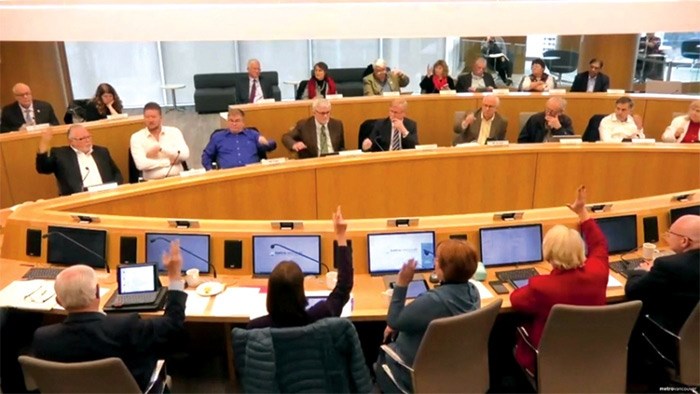 Metro Vancouver directors vote on a remuneration package including a retirement allowance. photo supplied
Metro Vancouver directors vote on a remuneration package including a retirement allowance. photo supplied
The Metro Vancouver board will reconsider its decision to implement a one-time retirement payment for outgoing politicians who sit on the regional body.
In a press release Tuesday, board chair and Port Coquitlam Mayor Greg Moore said he intended to put forward a motion of reconsideration at the next Metro meeting April 27.
The proposed change comes after residents from across the region expressed outrage about the retroactive payments on social media and through other feedback channels.
"As local government, we pride ourselves in listening to our citizens and finding solutions," Moore said in a press release. "Over the past week, we've recieved a tremendous amount of feedback and clearly we missed the mark with respect to the new remuneration bylaw. It is a sign of good leadership to admit a mistake and change directions."
In order to reconsider the bylaw, the chair will bring forward a motion of reconsideration later this month. If two-thirds of the board agree, the original remuneration bylaw will be put on the floor for debate.
Last month, the board voted in favour of implementing a retirement allowance, essentially giving a cash payout to board members who lose this fall or decide not to run for re-election. The payout, which would give sitting members 10.2% of their income for every year of service, was retroactive to 2007.
Don Bradley, Metro Vancouver's media relations manager, said the one-time payment would work out to an average of $1,100 for every year a representative has served to a maximum of 10 years. In the future, the rate would be calculated at 10.2% of a board member's annual income, which he noted works out to approximately $1,560 for every year served. (Alternates will not be eligible for the allowance.)
The retroactive payment would cost $498,000 while payments in the future were expected to cost the regional district $62,500 annually, according to a Metro Vancouver staff report.
The remuneration bylaw changes were also meant to address the federal government’s elimination of the non-taxable status for a third of board members’ income. In order to ensure that directors do not receive a pay cut as a result, Metro proposed increasing the stipend for board members to make up the difference.
@gmckennaTC


